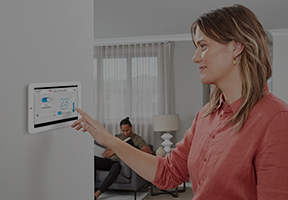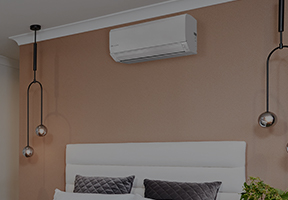Why is my heat pump leaking water inside??
You should check to see if your return air filters are clean and if they aren't, you should remove and clean them before re-installing them. Consideration also needs to be given to the environment as humid conditions may result in condensation dripping from the indoor unit (usually from the louvres).
Blocked drains can also cause water to drip from the unit and if you think this may be the case you should get your unit looked at by a professional. You will also find that the outdoor unit will drip water when using the heat pump in heating mode which is completely normal from the outdoor unit coil condensation.
Drain plug kits are provided for the outdoor units in the box when new, so should be used at the time of installation if there is a chance of water dripping onto an area you would like to keep clear.
Reasons Your Fujitsu Heat Pump is Dripping Water Inside
If there is water leaking from your domestic heat pump / air conditioner, there are a number of potential causes.
One of the most likely scenarios is that a tube inside the unit has disconnected from its coupling, allowing the water to escape.
Another possible cause of a leaking heat pump / air conditioner is a blocked condensation drain line, which is causing the condensation naturally produced by the unit to build up internally or leak out from any other opening it can find.
It is important to remember that the evaporator coil inside your heat pump / air conditioner will naturally produce condensation during use. However, the internal drain pan and drain line should be sufficient enough to enable the water to escape from the unit without leaking internally.
What to do if Your Heat Pump / Air Conditioner is Leaking Water
If there is water dripping from heat pumps / air conditioners installed at your home, there are a number of things you can do to check where the leak is coming from. Many of these remedies can be performed by you at home. However, if all the tips below fail, you may have no choice but to call in a professional.
Turn Off the Unit
If you have a leaking heat pump / air conditioner, the first thing you should do is switch off the unit. This will avoid encouraging the leak, allowing you to isolate it before it can spread. Turning off the unit can also help to avoid damaging it if the leak is the result of a fault. Once the unit is switched off and the leak has been contained, you can begin attempting to find its source.
Check the Drain Pan
Begin your investigation with your leaking heat pump / air conditioner’s drain pan. Not all air conditioners have a drain pan. The drain pan is a natural collection point for water produced by your unit through condensation. However, the water should drain away from the unit naturally using the connected drain line.
To check if there is an issue with your heat pump / air conditioner’s drainage system, first locate the drain pan beneath your indoor unit’s evaporator coil. The drain pan should appear damp, but it should never be full of water. If there is standing water in the drain pan, the water dripping from your heat pump / air conditioner could be a result of a blocked drainage system.
If your heat pump / air conditioner’s drain pan is full of water, remove and empty it before thoroughly inspecting it for any signs of damage or cracking. Remember that even a hairline crack in the drain pan could be the source of your leaking heat pump / air conditioner.
Inspect the Drain Line
If your leaking heat pump / air conditioner has been traced back to a full drain pan or it does not have a drain pan, your next inspection should be the drain line that connects to the pan. The drain line is designed to draw the condensation from your heat pump / air conditioner away from the indoor unit, however it can represent a common cause of leaks if it becomes clogged.
Check the drain line on your unit to determine whether the water dripping from your heat pump / air conditioner has been caused by a blockage in the pipe. If the line is blocked, use a thin, flexible brush to dislodge the debris, before cleaning any remaining dirt using a wet/dry vacuum cleaner.
Check the Filters
If the drain on your unit is not the reason your heat pump / air conditioner is dripping water, you can also check its filters. Dirty or clogged filters can cause the evaporator coils to run inefficiently, freezing and then thawing out. This drastic change in temperature leads to your unit producing excess amounts of moisture, potentially causing a leak.
If the filters in your heat pump / air conditioner are dirty but not cracked, you can clean them using warm water and a mild detergent according to the manufacturer’s operating manual. For more information on this process, please see our article linked below.
However, if the filters are visibly damaged, they should be replaced. Doing so will not only increase the efficiency of your unit, but it may also cure the issue of water dripping from your heat pump / air conditioner.
Related article: How to clean heat pump / air conditioner filters
Call a Professional
While the above steps to troubleshoot why your heat pump is dripping water inside the unit can all be carried out at home, there are some instances where professional help is required.
Fujitsu General’s technicians can help diagnose and repair leaking heat pumps / air conditioners from our range. If your unit is deemed faulty, is under warranty and meets the criteria to be repaired, we can also assist in the submission and management of the claim. For heat pump / air conditioners that are out of warranty, we recommend contacting a local, licensed technician. See our warranty information page. https://www.fujitsugeneral.co.nz/help-centre/warranty-information
Conclusion
If there is water dripping from your heat pump / air conditioner, it could be caused by a variety of factors. Our units are designed to produce moisture in the form of condensation during normal operation, however an excessive amount of water puddling around the unit is not normal.
Many leaking heat pumps / air conditioners can be rectified at home by inspecting the unit’s drainage system and cleaning or replacing the filters. More serious issues may need to be inspected by a Fujitsu General technician for heat pumps / air conditioners that are still in warranty, or by another licensed professional for out-of-warranty units.
To book a professional inspection of your leaking heat pump / air conditioning system, please contact us. https://www.fujitsugeneral.co.nz/contact-us








